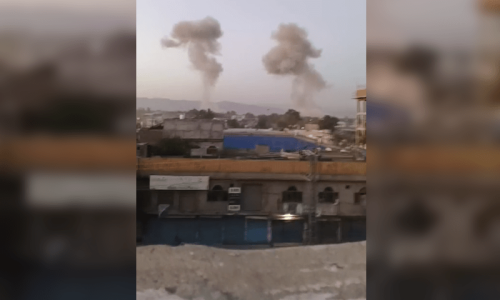President Musharraf has come up with Vision 2030. It is the longest distance vision in public life — 23 years. Other visions were for far shorter periods and with specific objectives and targets.
This vision is much broader and marked for its generalities. In fact, it is platitudinous. It is the vision of technocrats, not a party manifesto. It is not approved by the cabinet or endorsed by the national assembly. Nor is there any move for that. It is his election manifesto.
Earlier, the people were familiar with Perspective Plans for 20 years and then for 15 years, arguing 20 years was too long a period. Now there is vision for 23 years but it says the obvious and unexceptionable. What matters is what is done in practice.
The Vision contains no specific commitments that it seeks to fulfil and no specific targets, not even in the crucial energy sector. It is obvious that five-year plans are needed for a poor country to make the best use of its limited resources and for the largest number of poor and low income groups to benefit by the economic growth-- including drinking water for all and electricity in every home without frequent power failures.
The president wants political stability and sustained economic development. To achieve economic stability, sustained low inflation is needed, more like the two per cent in USA.. India has an inflation rate of 4.4 per cent and China is taking firm measures to lower the inflation rate to 5.2 per cent, caused by the overheating of its economy.
Inflation may be inevitable when an economy grows very fast and measures have to be taken to keep it low but the economic growth of Pakistan is not at the rate of China`s and yet we have an inflation of seven per cent along with the food inflation of over 10 per cent because of the free- for- all market practices.
Low inflation is the centre piece of economic stability. High inflation has many negative fall outs.
It is claimed that the core inflation has come to 5.2 from 5.6 per cent last year but what use is an inflation index that does not take into account the far higher food inflation and high energy prices in a country in which each family has a large number of dependents and one- third of its people live below the income of a dollar a day.
High inflation is one of the major causes of the under-nourishment of the people , particularly the children who are exposed to various diseases and that inflates the medical bill. It spurs corruption among the lower ranks of government employees and once an employee embarks on the road of corruption, he tries to make more and more money. High food prices are also behind the factors which make young men turn to crime and move from small crimes to big time crimes.
Violence against housewives is often caused by the high food prices as the mother cannot feed too many children on a low family budget. With low inflation we have few industrial strikes and less waste of the productive hours. Sustained inflation makes exports more costly and our products less competitive abroad. As a result we tend to lose our export markets. High inflation makes industrial investment more costly and delays the development of the country.
Sustained inflation makes the rupee weak and eventually it gets devalued or slides down in relation to the dollar. That is how our rupee has come to 61 to a dollar from Rs335 in the 1950’s. While the Indian rupee after revaluation hovers around Rs40 to a dollar. In spite of the obvious adverse results of high inflation, the government has been averse to taking firm measures to check soaring prices. Policies announced are not enforced and the profiteers and hoarders have a field day and cartels thrive fixing the prices higher and higher.
The government instead comes up with palliatives like the Ramazan package with a subsidy of Rs1.49 billon but there are barely 1000 utility stores through which the subsidised goods will be sold. So, the people have less access to such goods. Another 4000 more utility stores are to be opened all over the country eventually on the basis of one in each union council. But that is taking a long time. Even 5000 utility stores cannot meet the needs of the entire country and the cost of transportation to the utility stores and back home may negate the relief provided by these stores.
Meanwhile, flour mills have raised the price of atta as they do at every available opportunity. The city administration has reached an agreement with the traders on Ramazan prices but usually the prices are maintained as agreed for a few days and then the whole system collapses. There is a free for all and the market thereafter. The city administration should make sure that does not happen this time. The situation demands long-term sustained solutions instead of snap measures which fail after initial success and the people should also cooperate by not over consuming in Ramazan as is usually done and make Ramazan a season for feasting instead of fasting. If the president wants economic stability, he should strive for price stability along with low inflation and that can save the country from many ills, political, economic and social. A restrained monetary policy as practiced by the State Bank of Pakistan which has raised the discount rate to 10 per cent is not enough. The Governor of the State Bank, Ms Shamshad Akhtar has urged the government to take adequate administrative measures to ensure fair prices to supplement her efforts. But such efforts have not been forthcoming.
The president wants general elections every five years and five year plans. The right thing to do would be for every major party to have its own five-year plans. The party successful in the elections should enforce its five- year plans.
It is easy for the rulers to promise many things to the people but difficult to deliver them. Sometimes, the failure is due to indiscreet practices and outright violation of commitments.
In Pakistan, the people are not given a chance to reject such governments, instead the army removes them and seizes power. Then after a while the people want the army out of power. This vicious cycle has to come to an end and the people allowed to punish the betraying leaders though periodical elections and choose the new leaders while the army stays away from the political arena.














































